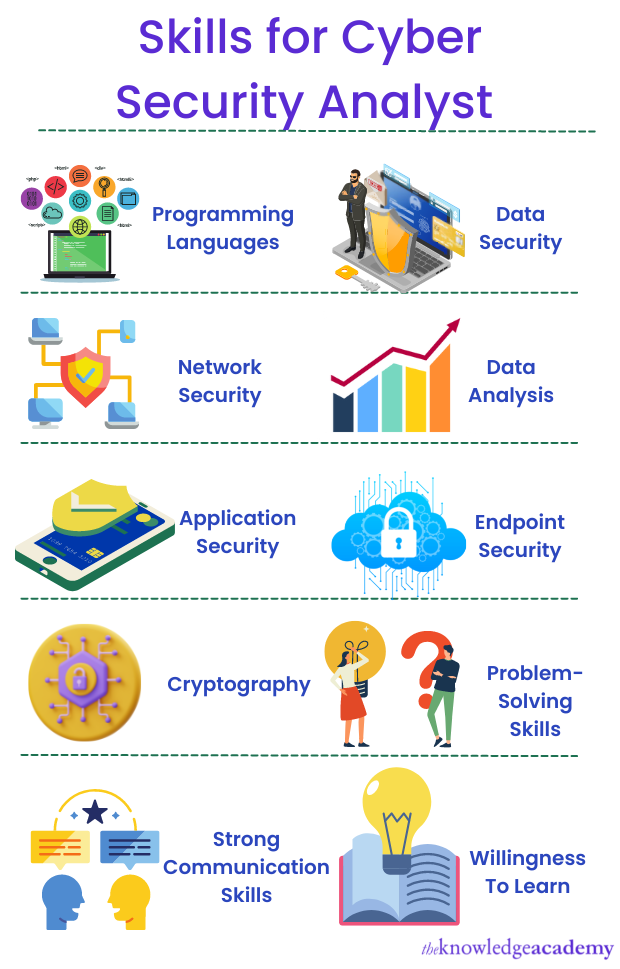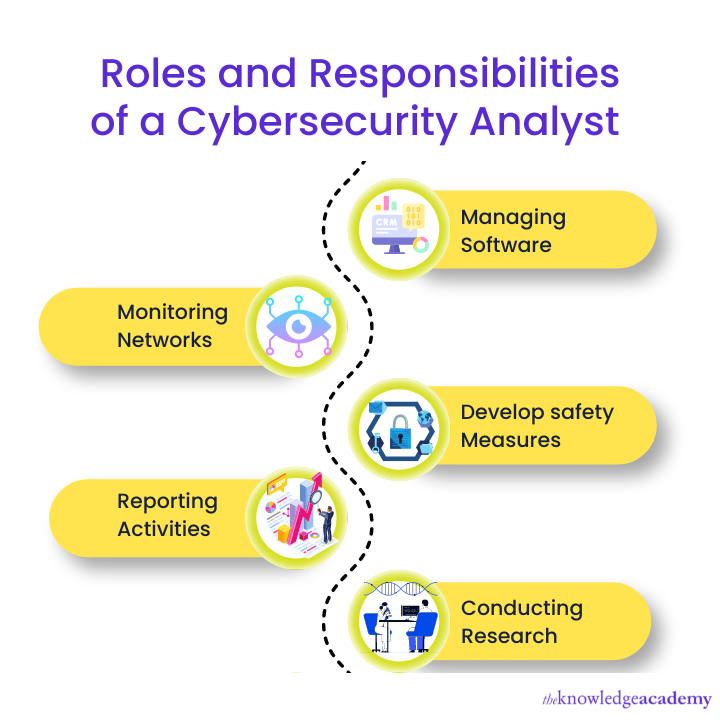We may not have the course you’re looking for. If you enquire or give us a call on 01344203999 and speak to our training experts, we may still be able to help with your training requirements.
Training Outcomes Within Your Budget!
We ensure quality, budget-alignment, and timely delivery by our expert instructors.

A Cybersecurity Analyst protects an organisation’s infrastructure, like hardware and software devices, against cybercriminals. An Analyst prevents cybercriminals from gaining unauthorised access to the data or stealing sensitive data. Organisations worldwide are willing to hire Cybersecurity Analysts to meet their short-term and long-term security goals. According to the US Bureau of Labor Statistics (BLS), the demand for Cybersecurity Analyst jobs can grow 35% from 2021 to 2031.
Table of Contents
1) Who is a Cyber Security Analyst?
2) How to become a Cyber Security Analyst?
3) Skills for Cyber Security Analyst
4) Roles and responsibilities of a Cybersecurity Analyst
5) Salary of a Cybersecurity Analyst
6) Conclusion
Who is a Cyber Security Analyst?
A Cybersecurity Analyst protects an organisation’s software, network, and hardware against cybercriminals. An Analyst's primary role is to monitor an organisation's IT infrastructure and identify potential threats related to it. Also, the Analyst can develop strategies to improve the organisation’s network security and shield confidential information. Some of the responsibilities carried out by a Cybersecurity Analyst are as follows:
Configuring tools: An Analyst can identify the organisation’s requirements and use the configuring tools to shield the organisation’s valuable information. They use tools such as password protectors, vulnerability management software, and virus protection software.
Reporting: An Analyst should be able to read reports based on the activities in an organisation’s network. These reports should include the details of unusual activities that are carried out in an organisation’s network.
Identifying weaknesses: The role of an Analyst is to ensure the organisation’s network is completely secured. A Cybersecurity Analyst can do this by testing a company’s network and identifying its weaknesses beforehand to prevent cyberattacks.
Are you interested in acquiring skills to mitigate cyber-related risks? Then, register with the CCNA Cybersecurity Operation Training now!
How to become a Cyber Security Analyst?

You can follow the below-mentioned steps to become a Cyber Security Analyst:
Bachelor's degree or diploma
To become a Cybersecurity Analyst, you should have a Diploma or a Bachelor’s degree in Computer Science, Information Technology, Digital Forensics, etc. These courses provide a basic understanding of programming, data, Cyber Security, networking, and operating systems. You can also complete one of these courses to work as a successful Cybersecurity Analyst:
a) Bachelor of Computer Application (BCA)
b) Diploma in Cyber Security
c) BE in Cyber Security
d) BSc in Cyber Security
e) B.Tech in Computer Science and Engineering
Relevant experience
To become a Cybersecurity Analyst, you can get started by getting relevant experience in Cyber Security. It can boost your resume and help you get the job. One of the best ways to gain work experience is to take part in college internships during graduation. You can also gain on-field expertise in Information Technology by applying for IT jobs like a programmer.
Obtain certification
Obtaining a certification will help you stay up-to-date with best practices and new processes used in the cyber security field. Most organisations are willing to hire individuals who possess relevant certifications. Individuals without an educational background in the domain of Cyber Security can also get a job with the help of a certification. Some of the most helpful Cybersecurity certifications for you are as follows:
CompTIA Security+ Certification: This entry-level certification is helpful for candidates who want to start this field from scratch. The certification allows individuals to learn about cyber-attacks, network design and architecture, and implementation of security compliances.
Global Information Assurance Certification (GIAC) Security Essentials: It is an entry-level certification. However, it is suitable for candidates who know networking and information systems. In addition, it helps individuals to learn skills related to cloud security, cryptography, and network security.
Certified Information Systems Security Professional (CISSP) Certification: This certification helps individuals to learn advanced Cyber Security skills. It helps to improve the knowledge of experienced individuals.
Create a resume
A good resume highlighting your Cyber Security knowledge and practical skills can set you apart from others during the interview. Apart from educational certifications and qualifications, a good resume highlights the professional experience and skills you have gained during an internship.
If you don’t have any experience in Cyber Security, you can highlight your college projects and GPA in your resume. Whereas, if you are an experienced candidate, you should highlight your work experience.
Network
If you want to become a Cyber Security Analyst, it’s important to build a network with other professionals in the industry. It will help you to stay informed about the latest job opportunities in the field of Cyber Security.
Are you an advanced professional with high experience and knowledge in a wide range of security areas? Then check out our Microsoft Cybersecurity Architect SC100 course now!
Skills for Cyber Security Analyst

A Cyber Security Analyst should possess basic technical skills related to security, networking and system architecture, and programming. Some of the basic skills required to become a Cybersecurity Analyst are as follows:
Programming languages: A Cybersecurity Analyst should be familiar with programming languages like C#, PHP, Java, C++, Python, and C. A sound language of programming languages helps analysts interpret codes and write custom scripts.
Data security: An Analyst should protect the data against unauthorised access and malicious attacks.
Network security: Cybersecurity Analysts should be able to improve the privacy and security of an organisation’s IT infrastructure by configuring software, networks, and hardware.
Data analysis: These professionals should analyse the stored data thoroughly to identify threats and predict changes. Businesses can use these results to create safety plans.
Application security: The professionals should be able to identify security risks related to mobile and web applications. Next, they should devise strategies to minimise them.
Endpoint security: They should have the skills to secure the endpoint devices of end-users and clients.
Cryptography: An Analyst should encrypt different communication modes with the help of data encryption techniques.
Apart from these technical skills, an Analyst should have the soft skills required to carry out their job successfully. Some of the important soft skills needed to become a Cybersecurity Analyst are as follows:
Problem-solving skills: Cybersecurity Analysts should be able to identify sudden challenges and develop response strategies.
Strong communication skills: An Analyst should be able to interact with the IT team and discover any security breaches in the system. They should be able to explain any compliance issues with non-technical and technical employees of an organisation.
rn Willingness to lea: Cybersecurity Analysts should be eager to learn about evolving threats, procedures, and tools used in the domain of Cyber Security.
Roles and responsibilities of a Cybersecurity Analyst

A Cybersecurity Analyst should be able to develop strategies to combat cyber-attacks. Some of the responsibilities of a Cybersecurity Analyst are as follows:
Managing software: An Analyst is responsible for installing software on networks and systems of an organisation. They also update this software frequently to minimise security issues on them.
Monitoring networks: They monitor networks to keep track of activities inside them. Proper monitoring helps Cybersecurity Analysts identify any harmful activities inside the incoming code. Now, an Analyst will respond to these activities accordingly.
Develop safety measures: An Analyst should be able to develop the best data safety measures for safeguarding the activities of end users and employees.
Reporting activities: An Analyst should have the knowledge to prepare safety reports highlighting the safety issues and practices that should be followed to solve them.
Conducting research: Cybersecurity Analysts should research new trends in Information Technology and Security. It helps them to stay up-to-date with potential attacks and develop preventive measures to resolve them.
Do you want to identify attacks and vulnerabilities before infiltration professionally? Then, you can register with the CompTIA Cybersecurity Analyst CySA+ Certification course for Expert training and help.
Salary of a Cybersecurity Analyst
The salary package of a Cybersecurity Analyst can vary according to factors such as location, sectors, skills, experience, and qualifications. However, as per the US Bureau of Labor Statistics, a Cybersecurity Analyst earns an average salary of 81,958.11 GBP.
Conclusion
The primary role of a Cybersecurity Analyst is to secure an organisation’s systems and network against cyberattacks. A Cybersecurity Analyst can do it by developing contingency plans, researching future IT trends, reviewing unusual activities, and reporting security breaches. Additionally, an Analyst can teach the other employees how to implement security measures which will prepare the employees to respond to future attacks.
As a Cybersecurity Analyst, you should be able to implement security controls to protect against threats. To become a Cybersecurity Analyst, you can attend online boot camps or join a crash course related to Cyber Security.
To enhance your skills and gain in-depth knowledge in Information security, you can register for our CISSP Training courses now.
Frequently Asked Questions
Upcoming IT Security & Data Protection Resources Batches & Dates
Date
 Certified Cyber Security Professional (CCS-PRO)
Certified Cyber Security Professional (CCS-PRO)
Fri 21st Mar 2025
Fri 23rd May 2025
Fri 22nd Aug 2025
Fri 5th Dec 2025







 Top Rated Course
Top Rated Course




 If you wish to make any changes to your course, please
If you wish to make any changes to your course, please


